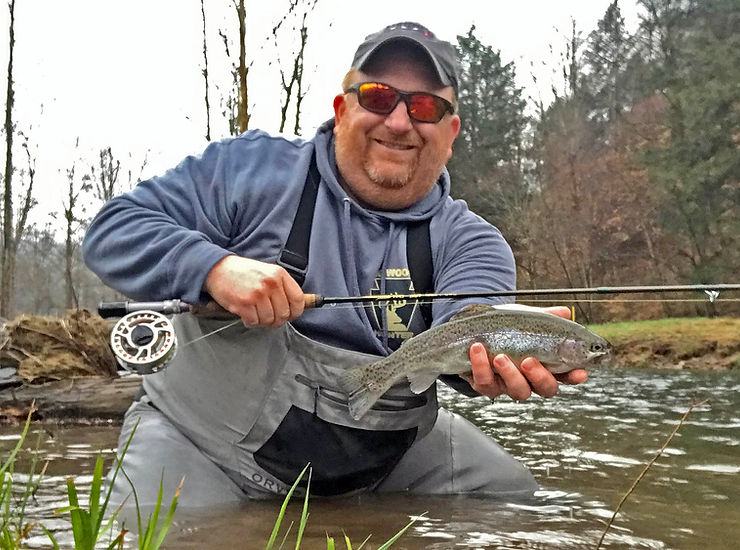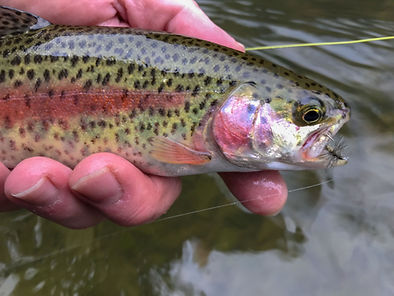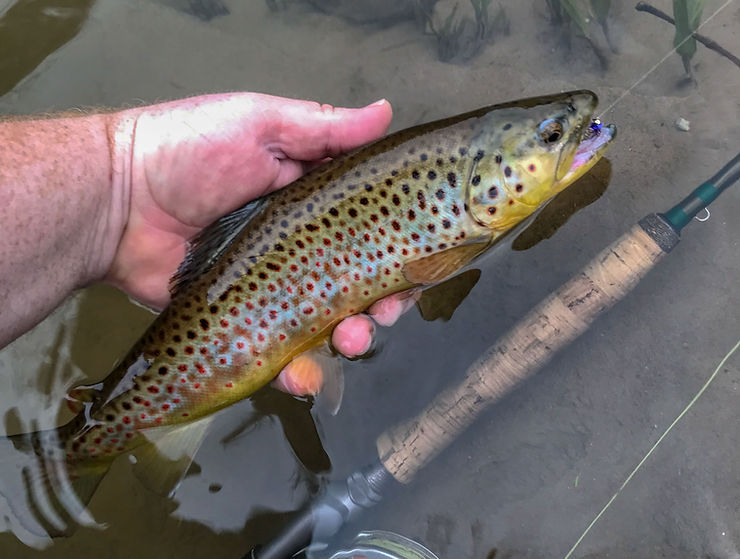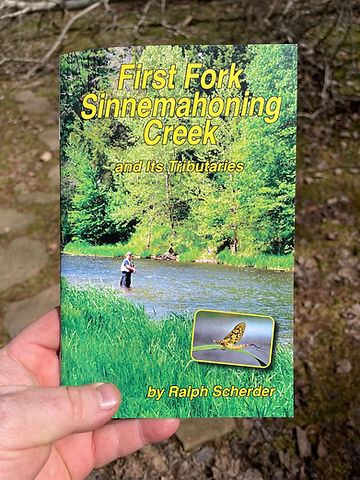April Showers Bring…Blue Quills on First Fork!

I caught two trout on my first two casts before I realized there was a full scale Blue Quill hatch going on and trout were rising all around me. The rises were subtle, which is why I hadn’t noticed them when I first waded out into the stream. And then I was distracted by those first two rainbows. But as I released the second fish, a trout splashed at a fly less than five feet in front of me, and that’s when I started realizing that not all of the dimples on the water’s surface were raindrops. At least two dozen of them were rising trout!
Blue Quills aren’t exactly the type of fly you notice right away. They’re small, size 18 or so on First Fork Sinnemahoning Creek, which is where I was fishing. Also, it was a dreary, rainy day, and the dark blue dun color of the fly made it difficult to see in those conditions.
And besides, my eyes aren’t what they used to be. Too many long hours at the fly tying bench without the proper lighting, I suppose.
In my defense, there weren’t many bugs in the air. I had the feeling that weather conditions kept them from completely emerging and taking flight. They were trapped in the surface film, which is why the trout rises were so subtle. Most of the trout never broke the surface to feed and all I saw was a chrome flash and a slight swirl that you wouldn’t even notice if you weren’t already looking that direction.
At first, I didn’t want to switch over to the dries because the fish were practically jumping on the Rainbow Sexy Walt. I caught four more trout in only a handful of casts before I figured what the heck, I may as well try to match the hatch.
I changed my Euro leader setup to a 9 ½ foot tapered leader and another 3 foot section of 6x tippet on the end of that. Back in the spring of 2020, I bought a TFO 3-weight Drift Rod, which is a 6-piece rod with interchangeable sections that allows you to modify the length of the rod from 9-12 feet without having to re-string your line. It’s a great Euro rod, but an even better dry fly rod. When using a matching Rio 3-weight WF line, you can sling a dry fly a country mile. However, prior to this season, I decided I was going to learn how to “officially” Euro-nymph and bought a tactical Euro-nymphing line. You can still get some distance with a dry fly, but it’s probably only half the distance as a WF line.
It’s hard to find a one-size-fits-all setup. This one is fairly close, though.
So far, it’s been a weird season for me. The weather hasn’t cooperated at all. It’s been cold and wet here in Potter County.
More than that, though, moving from Butler to here has required more attention than I’d thought it would, and there’s been no shortage of things to do. I’ve been out a few times, and caught numerous trout each time, but still hadn’t experienced that first really good outing of the year.
I know when I haven’t fished enough. My chops get rusty. The rod feels a little clunky in my hand. I’m not as confident about fly presentation. Everything just feels “off.”
That all started to change last Saturday when I was fishing with my cousin Denny. I landed a chunky rainbow on my second cast, lost one on my fourth cast, and then landed another nice rainbow on my sixth cast. Over the next hour, I consistently landed or hooked fish on every few casts, and then a monsoon of a rainstorm chased us off the water.
I was excited to get back to fish that stretch of First Fork, and I finally got there Thursday late afternoon. Of course, it was raining again, but I was optimistic. A steady sprinkle when the air temp is only 35 degrees can shut down the bite. However, the same rain when it’s 48 degrees can be killer – and it was just the perfect scenario to bring out the Blue Quills.
I’ve hit Blue Quill hatches in the past, but this was the first time that no other insects were also coming off. Typically, Quill Gordons will appear with the Blue Quills. That day, though, it was Blue Quills or bust.

I decided to try a size 16 Blue-Winged Olive (BWO) instead of a size 18 Blue Quill that would’ve perfectly matched the hatch. The size 16 was easier to tie on and more visible on the water’s surface. It might seem like blasphemy to deliberately use the wrong fly, but in the world of fly fishing for trout, “close” usually works just fine, and you can get away with a slight size discrepancy as long as the colors match.
Also, I wanted to keep the smaller patterns as a backup. In other words, I planned to pick off the eager biters with the larger fly, and then later I could scale down to the size 18 to get the finicky ones if I had to.
As it turned out, I never had to scale down. The size 16 BWO worked just fine. On my very first cast, a trout came up for the fly but hit with an open mouth. Second cast, I threw a little mend in the line to give it a better drag-free drift, and this time the trout was on the end when I lifted the rod tip.
A trout usually hits with an open mouth when it’s not convinced that the fly is real. The trout is basically telling you that you’re either using the wrong fly or you’re not making a quality presentation. Generally speaking, and this is from personal observation, 90% of refusals are because of poor presentation, not fly choice – provided that the fly you’re using is at least close to what the fish are actually feeding on.
Of course, that observation goes out the window on highly-pressured, technical streams where every trout carries a magnifying glass in its back pocket! On those streams, matching the hatch can be a tedious and frustrating affair.
That’s not to say that I didn’t have a fair number of trout inspect my Blue-Winged Olive and decide not to hit on the first drift. Those trout almost always hit on the second or third pass, though, after I buckled down and focused on a better drift or made a more accurate cast that put the fly directly in its feeding lane.
For three hours straight I landed trout after trout. All of them were chunkers that fought hard. Eventually the hatch petered out and all of the fish stopped rising, but I still picked up a few stragglers on the BWO. Eventually I went about 15 minutes without a catch and switched back to my nymph rig.
I don’t know how many trout I landed on the dry fly. I stopped counting catches years ago, but I’m guessing it was in the neighborhood of 30 fish. At least it felt like 30.
I would’ve quit when the hatch stopped except that there was one particular trout I wanted to try to catch yet. I figured this trout to be a good-sized brown that had probably been in the stream a while. It was darker-colored than the rest of the trout I’d caught and had refused my BWO several times.
I tied on my brown trout killer specifically for this fish – a purple Sexy Walt. I tie this pattern with a Micro Polar Chenille collar, and it has produced some really fine browns, both stocked and wild, for me the past couple of years. It also slayed the steelhead one day last fall in Erie.
The first cast was money. I watched my line pass through a narrow chute between two mid-stream rocks. The line twitched, I set the hook, and a few minutes later brought to hand a hard-fighting 14-inch brown with beautiful coloration. I snapped a picture with my phone and then watched the fish dart back out into the current. Sometimes it’s that easy.

Check out the stream guide for First Fork Sinnemahoning Creek and its Tributaries in the online store, available in both print and as a digital download.
Sign up for the Dark Skies Fly Fishing e-newsletter
It's free, delivered to your inbox approximately three times each month.
Sign Up Now

